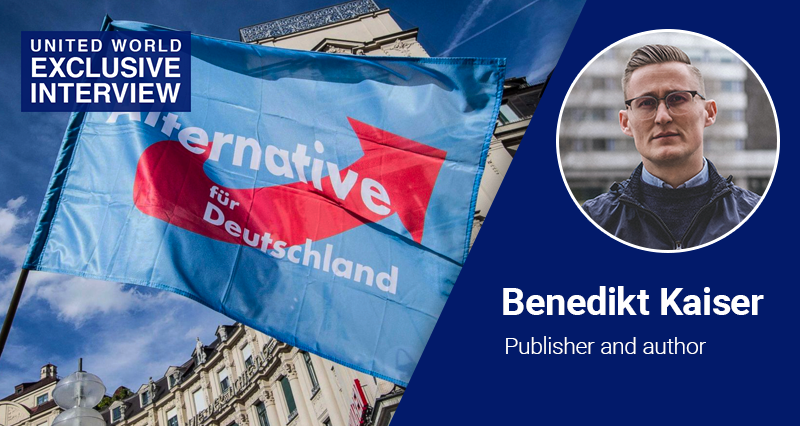By Can Çakır
In recent election polls published in Germany in the past weeks, the three-party coalition consisting of the Social Democratic Party (SPD), the Greens, and the Free Democratic Party (FDP), appears to loose the majority in the parliament. The Christian Democratic Union/Christian Social Union (CDU/CSU), the main opposition party, came out by far in the first place while the Alternative for Germany (AfD) ranks second.
These poll results dominated the public agenda. We conducted an interview with publisher-author Benedikt Kaiser, who has written books on German politics and the AfD. Among them are titles such as “Blick nach links” (A look to the left), “Solidarischer Patriotismus” (Solidary patriotism), “IfS-Studie Corona und Profit” (IfS-Study Corona and Profit) and “Die Partei und ihr Vorfeld” (The party and its surroundings).
“Far-right” accusation coming from of left-liberal Transatlanticists
According to the latest polls, the AfD’s vote reaches 20 percent. At the same time, there has been talk of a “party ban”. How do you interpret this?
Traditional parties have long been afraid of not being able to maintain power. They could easily handle opposition with a 5% share of the population. They began to worry when it reached 10%. When it reaches 15%, their system started to shake. And at 20%, they panicked. What we are now experiencing is exactly that.
The escalation of tension originates from above against the opposition from below. Events developed as follows: The government protection agency, known as the Federal Office for the Protection of the Constitution, places certain segments under “surveillance.” For instance, the most successful organization of the AfD, the Thuringia organization, is listed as “definitely right-wing extremist.” The same applies to significant organizations within the AfD circle, such as the initiative “Ein Prozent” (One Percent) and the think tank “Institut für Staatspolitik” (Institute for State Politics). The aim is to smear individuals and bring them under suspicion.
Well, what does “far-right” actually mean? Left-liberal Transatlanticists from all parties can easily define it! Today, supporting peace negotiations in Ukraine or embracing a multipolar world order where Western values will be just one pole without hegemony anymore – that is enough for them to determine someone as “far-right”. To them, “de-legitimization” of the government, in other words, something that every opposition does, is again something “far-right”.
The Greens falling from favor
Polls show a decline in support for the current coalition government. What is your take on this?
The social-democratic-left-liberal coalition consisting of the SPD (Social Democratic Party), the Greens, and the FDP (Free Democratic Party) is actually mainly guided by the Greens. However the Greens are now falling from favor.
The installation of heat pumps instead of “classic” heating systems, the ongoing deindustrialization and the possibility of a remarkable number of job losses, the principle of “open borders for everyone!”, the new citizenship law, the submission to the United States, fetishizing gender issues… Due to the conceptual-theoretical dominance within the coalition many people are finally realizing what the Greens actually represent in practice. As a result, there is a steady downward trend for the coalition.
So far, many voters naively believed that the Greens stand for environmental protection, animal welfare, more walking paths, love and joy etc. Now we see that the Greens are generally ideologues detached from the people and to some extent climate sectarians. This is now costing the citizens too much! In this period of inflation and declining purchasing power, many Germans are no longer tolerating it. Discontent is increasing.
Traditional parties vs. the AfD
The AfD is likely to remain in opposition in the near future despite its rise in votes. Why don’t the traditional parties want to form a government coalition with the AfD?
Firstly, it should be noted that the AfD is not perfect as a collective party of patriotic powers. It has ideological, personal, qualitative, and quantitative shortcomings. However, the crucial point is that the AfD is the only in parliament for the people.
Generally, traditional parties view Germany not as a historical subject that needs to be preserved but as an open settlement area and economic hub, part of the EU-US complex, and thus a forward outpost of the “Western values”. It is difficult to reconcile this view with a party that advocates national sovereignty, multipolar international cooperation and non-interventionist German foreign policy.
Under the leadership of Tino Chrupalla, the AfD is an antithesis to the globalist order. It can be hoped that this line will be further strengthened. Even within the AfD, there are still strong Transatlanticists and believers in Western markets.
Near future of the AfD
Will the AfD work towards the goal of becoming a part of the government in the near future?
It would be good for the AfD not to seek to join the government on its own. Three other things are crucially important.
Firstly, the AfD needs to continue increase votes in elections. The goal could be to reach around 25% nationwide and 35% in East Germany. This can change the overall configuration in German politics. Some second-tier figures within the CDU and CSU might engage in talks with the AfD. In that case, participation in the government in East Germany could be considered in the long term.
Secondly, the AfD should programmatically maintain its ongoing political line. It should take a clear stance against the current coalition government and the semi-opposition of the CDU/CSU and continue to advocate neutrality and multipolarity in foreign policy. In this process, it is advisable to continue the line of social patriotism that was tentatively introduced. More should be done so that the people perceive the party as that of workers, wage earners, and small business owners – an issue that is becoming increasingly important due to growing crises.
Thirdly, the AfD should allocate more time and resources to youths, organizational development, and educational programs. It needs to get better than the traditional parties in every area. This, to borrow Lenin’s eternal maxim, means: Learn, learn, and learn again.
















Leave a Reply